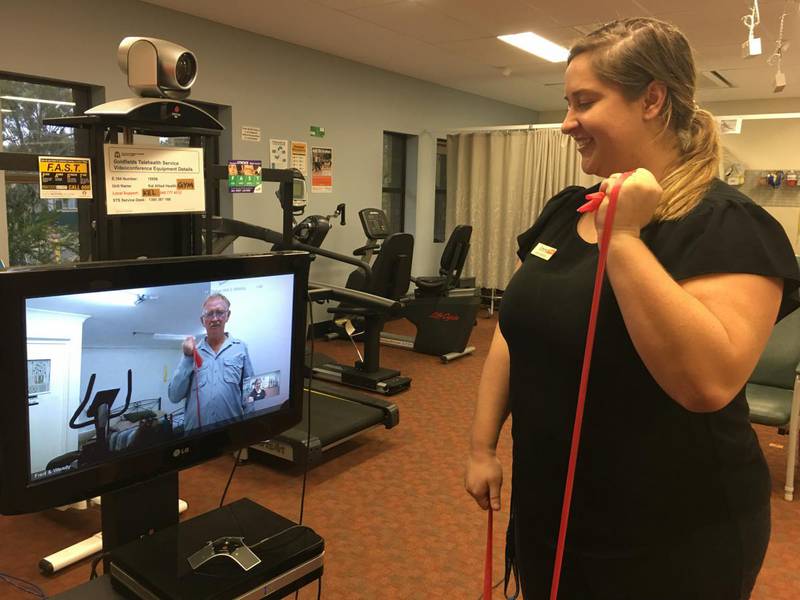Telehealth allows Fred to do rehab from the mines
 Telehealth user Fred Sellars, who has Parkinson’s disease, goes through some exercises by telehealth with Kalgoorlie Day Therapy Unit Physiotherapist Emma Johansen.
Telehealth user Fred Sellars, who has Parkinson’s disease, goes through some exercises by telehealth with Kalgoorlie Day Therapy Unit Physiotherapist Emma Johansen.
Despite being diagnosed with Parkinson’s disease five years ago, Fred Sellars has only recently been able to take part in regular rehabilitation and support classes.
His location on a minesite 30km from Laverton meant driving the nine-hour round trip to Kalgoorlie each week was just too taxing on him and his wife, Wendy.
That was before Kalgoorlie Health Campus started offering therapy by telehealth.
A short time ago his GP in Kalgoorlie let him know a weekly Parkinson’s support group was starting up at the hospital. Allied Health staff at the hospital then told him he would be able to attend the group as well as regular physio, speech and occupational therapy sessions by telehealth.
Healthcare delivered closer to home is under the spotlight this week as part of Telehealth Awareness Week, 25–29 June.
The week has been organised by the WA Country Health Service and its service partners to highlight that healthcare appointments delivered by telehealth are now widely available to country patients, without the stress and cost of travel.
An increasing number of health practitioners such as allied health therapists are using telehealth to make their services more accessible.
Services offered so far include self-care re-training, strength exercises, mobility and balance exercises and memory training from home by occupational and speech therapists and physiotherapists
The Goldfields rehabilitation team will also offer the option to attend education sessions by telehealth from around the region, including stroke and falls prevention education.
Fred has now had a handful of telehealth sessions from home at Mt Windarra Mine, enjoying the chance to catch up with others who have Parkinson’s as well as take physical therapy sessions.
Wife Wendy says they haven’t looked back.
“I can’t stress enough how brilliant telehealth is,” she said.
“If we need to go to a session in Kalgoorlie, we have to get up at 3am so I can get my work as a caretaker done before we leave at 4.30am, to get to Kalgoorlie for the early appointments at 9am.
“It is stressful and tiring for people when they have to drive long distances and sitting for that length of time isn’t comfortable.”
Now, to join in the group and individual sessions, Fred simply logs on to his laptop computer at home using software he was helped to install remotely by the Service Desk of the Statewide Telehealth Service – and away he goes.
“Fred does group support sessions by telehealth which is great because he gets to share his experiences with other people with Parkinson’s and they problem-solve with each other and compare experiences,” Sophie Luke, Acting Subacute Care Coordinator at the Kalgoorlie Hospital Day Therapy Unit, said.
“He then does his exercise classes. For that, we send him the exercise sheets via email beforehand and he prints them out so he knows what he has to do.
“He can then follow along more easily with the physiotherapist while he watches from home.”
Wendy said the couple also saved money from not having to drive to Kalgoorlie so often.
They were now investigating whether Fred would be able to do his specialist appointments by telehealth to save the two annual trips to Perth for those.
Wendy said Fred was pleased his preparation time for appointments had been cut drastically from dressing, driving and parking, to just dressing.
“He doesn’t have to rush to get to an appointment on time, he just has to be in front of our computer screen on time,” she said.
People in most rural and remote towns across WA can access healthcare appointments using telehealth for more than 30 specialities including cancer services, surgical follow-up, respiratory medicine, blood-related disorders, orthopaedics as well as education for chronic conditions like diabetes and asthma.
Telehealth Awareness Week includes the launch of a 1300 number for telehealth inquiries, a statewide regional advertising and social media campaign, new information materials for patients and healthcare professionals, and displays in hospitals and health centres across the State.
People can enquire about having an appointment by telehealth by asking their health professional or calling 1300 367 166.
More information about telehealth is available at www.healthywa.wa.gov.au/telehealth
Do you have a good telehealth story? Share it on your favourite social media channel with the hashtag #telehealthwa or on Patient Opinion
Fact File
- Telehealth saved WA country patients from travelling 27.3 million kilometres in 2017 – that’s about 12,500 return trips across the Nullarbor, or 35 trips to the moon and back.
- About 350 outpatient appointments are delivered every week by telehealth at more than 150 telehealth-enabled sites across WA.
- In 2017, there were more than 18,000 outpatient consultations by telehealth across country WA, a one-third increase on 2016.
- More than 7000 mental health services were delivered via telehealth across country WA in 2017.
- More than 30 outpatient specialties delivered via telehealth are now available closer to home for country people. The top five in 2017 were plastic surgery, respiratory medicine, haematology, orthopaedics and gastroenterology.
- Health services delivered by telehealth include emergency care, cancer treatment, palliative care, mental health, stroke emergency treatment and rehabilitation, surgical follow-up and education for chronic conditions such as diabetes and asthma.
Media enquiries: WACHS Communications - wachs.comms@health.wa.gov.au

